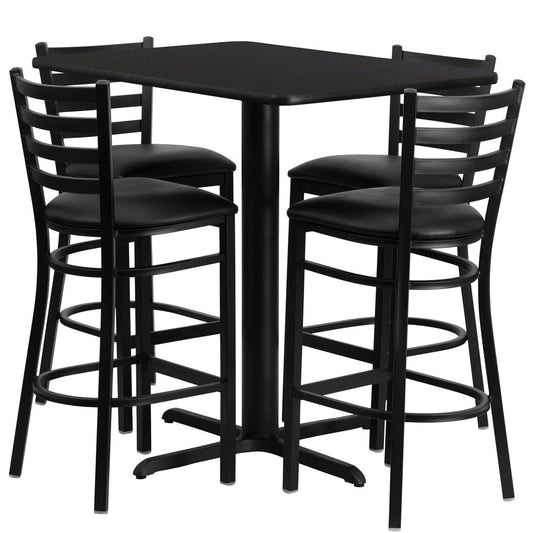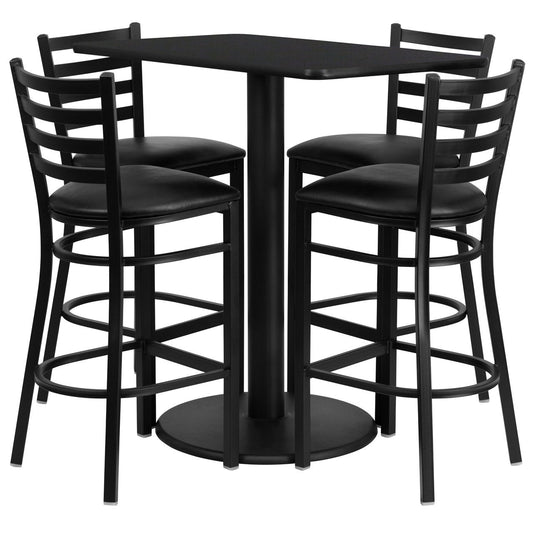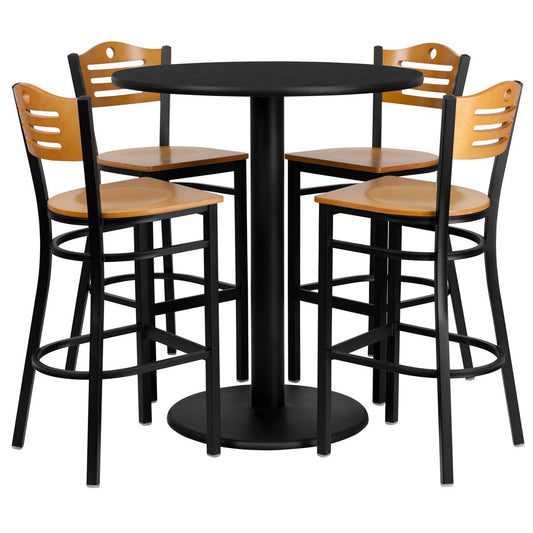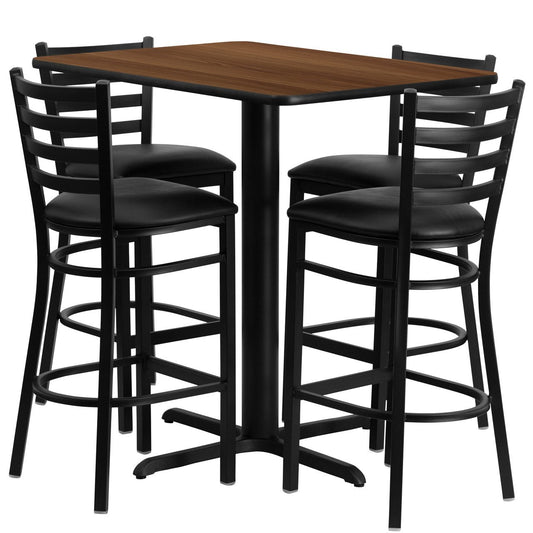
8 Pros and Cons of Commercial Metal & Wood Bar Stools
Share
The choice of bar stools for commercial areas is usually defined by two main materials: metal and wood. Therefore, care must be taken before investing in these important seating solutions. Aesthetic bar seating can be made from several materials, including wood, metal, and upholstery. In this comprehensive guide, we will cover all the commercial metal bar stools and wooden bar stools. One should be able to make the right decision after reading, helping you make an informed choice.

LACEY Series Solid Back Mahogany Wood Restaurant Barstool
The wood barstool will offer a classic, elegant look when furnishing your establishment. This stool will make an attractive addition to your restaurant, pool hall, lounge, bar or other high traffic venue. This stool is easy to clean, which is an important aspect when it comes to a business.
Why Choosing the Right Material Matters?
The choice of bar stool material significantly impacts the overall aesthetics, durability, and functionality of your establishment. If it is a wooden bar, the wood should be 'in line with the brand' and allow for heavy use. Whether it is a cafe, bar, or fine dining, the imagery should evoke thoughts of warmth and comfort.
The Pros of Commercial Metal Bar Stools
 1. Exceptional Durability
1. Exceptional Durability
Bar metal stools are known for their strength and longevity. They are designed to withstand tough conditions where they will not be subjected to bending, cracking, and wear and tear. Their structure and design only provide the best and longest-lasting service to their users.
2. Easy Maintenance
Metal bar stools are easy to maintain. Maintenance-free maintenance can be done by simply wiping with a cloth. They are less susceptible to stains, unpleasant odors, and stains, making them perfect for bars and restaurants where spills occur frequently.
3. Versatile Design Options
Metal bar stools have a contemporary design, making them suitable for modern homes or offices. You can use chrome, matte black, and brushed steel as complements to fit all interiors.
4. Fire Resistance
Unlike wood, metal does not burn easily, it is fire-resistant, making it beneficial for buildings where the risk of fire is common.
5. Eco-Friendly
Metal bar stools are indeed a sustainable option, as the metal is easy to recycle. Investing in metal furniture helps reduce waste and environmental strain. Several commercial metal bar stools are made of recycled products, therefore practicing eco-friendly activities.
6. Stability and Safety
The heavy-duty construction of metal stools provides greater stability and safety, especially in high-traffic areas. They are ideal for bars, cafes, and restaurants in public areas due to their strong base and secure frame, which reduce the probability of tipping over.
7. Variety in Height Adjustments
Metal bar stools are known to have adjustable height features, making them practical and comfortable for use by varying users. This feature enables their use in various settings, including bar counters, kitchen islands, and elevated tables.
8. Cost-Effective Investment
Investing in commercial metal bar stools will be cost-effective in the long run, as they are easy to maintain and have a long life. A sturdy structure eliminates the need for replacements, thereby enhancing the value of the investment over time.

HERCULES Series Vertical Slat Back Walnut Wood Restaurant Barstool
The wood barstool will offer a classic, elegant look when furnishing your establishment. This stool will make an attractive addition to your restaurant, pool hall, lounge, bar or other high traffic venue. This stool is easy to clean, which is an important aspect when it comes to a business.
The Cons of Commercial Metal Bar Stools
1. Cold and Uncomfortable
Metal can be too cold for individuals living in cold regions. Such loss of thermal energy may be off-putting to some customers. Some customers may find the metal design attractive and may prefer to add cushions or leather seats, but this will increase the price significantly.
2. Risk of Scratches
Metal bar stools are sturdy, but they can be scratches and dents, due to too much weight on one end, especially in busy areas. Over time, these factors can gradually diminish the aesthetic appeal of the stool.
3. Weight and Mobility
Metal stools are more difficult to rearrange or move in a given space due to their heavy structure. This can become a challenge in high-activity areas, where space adjustments are frequent.
4. Prone to Rust and Corrosion
While metals possess long-term resilience, frequent exposure to moisture and potentially humid environments can cause them to rust and corrode over time. This phenomenon particularly affects metals such as iron, which require additional coatings or maintenance to ensure their durability.
5. Noise Issues
The Movement of metal bar stools over hard floors may at times create noise, which could be disturbing in environments where a rather silent environment is required, such as elegant restaurants or even offices.
6. Limited Comfort Without Padding
Without Padding Without additional padding, metal-provided stools can cause discomfort during prolonged sitting, particularly on rougher surfaces. This problem arises in locations where customers or employees are required to sit for extended periods.
7. Cold Aesthetic
While metal bar stools have a sleek, modern look, some people may find them too harsh or
sterile in certain settings, especially if the environment is meant to feel cozy or inviting. In such cases, metal stools may not contribute to achieving a warm and friendly atmosphere.
8. Potential Cost for Padding
One drawback of metal bar stools is its lack of intrinsic comfort, particularly for long durations of sitting. This often demands the addition of cushions or padding to improve usability. However, this raises the initial cost and may increase expenses over time if the padding requires regular maintenance or replacement.
The Pros of Commercial Wood Bar Stools
1. Timeless Aesthetic Appeal
A wooden bar stool consistently adds its traditional charm and warmth to its surroundings. No matter the size of the space, wood materials, and their textures are perfect for traditional or rustic spaces.
2. Customization Opportunities
There are also many customization options with wooden stools. So, you have the option of choosing oak, cherry, or mahogany fillers, as well as different stains and finishes.
3. Lightweight and Portable
Wooden bar stools are generally not as dense as metal stools, they are easier to move. This is useful in bars or restaurants that have a variety of seating arrangements.
4. Comfortable Seating
Being a natural insulator, wood enhances comfort, especially for customers sitting in cold areas. Additionally, many round wooden bar stools have shaped seats to further enhance comfort.
5. Eco-Friendly and Sustainable
Wood bar stools can be greener if sourced responsibly. Because many woodworkers use sustainable wood, these eco-friendly stools are great for companies who want to reduce their carbon footprint.
6. Durable and Long-Lasting
High-quality wooden bar stools are robust and lasting. A wooden stool is a handy, durable, and inexpensive piece of furniture. They endure years without replacement.
7. Warm and Inviting Atmosphere
Comfortable and supportive, the circular stool creates a cozy and friendly atmosphere. Your living area or office feels warm and inviting with the sophistication of natural wood color.
8. Sound Absorption
Wood bar stool isn't dense enough to absorb sound. Wood having holes, grooves, or slots reduces sound as a perforated resonator. Wood's sound absorption improves with porousness. Soundwaves are fragmented by panels.

Heavy Duty Black Ladder Back Swivel Metal Bar Stool
The Heavy Duty Black Ladder Back Swivel Metal Bar Stool - Black Vinyl Seat is a top choice for outfitting restaurants, pool halls, lounges, bars, and other high-traffic areas. This stool is designed for ease of cleaning, a critical feature for any business.
The Cons of Commercial Wood Bar Stools
1. Susceptibility to Damage
Wood is more susceptible to scratches, dents, and water exposure than metal. In busy spaces, the lifespan of such wooden bar stools can be very short if not properly cared for.
2. High Maintenance
To maintain their beauty, good quality wooden bar stools need to be cleaned, polished, and sometimes refinished. Neglecting these bar stools will reduce their lifespan.
3. Higher Costs
For many customers, purchasing wooden stools can be challenging due to their higher price compared to metal stools, even though they are always attractive.
4. Vulnerability to Temperature and Humidity
Varying thermal and humidity conditions can alter the dimensions of wood, causing it to swell, shrink, or warp over time. Therefore, wooden bar stools would be unsuitable for use on outdoor terraces or other places where there is high humidity.
5. Prone to Fading
One of the most problematic issues with wooden stools is their use in sunny areas. The sun's rays can penetrate and shine through the light-colored natural wood, causing the wood to fade over time.
6. Limited Durability in High-traffic Areas
While wood is durable, wood is not as resilient to wear and tear as metal in high-activity locations. Such places see constant use, increasing the risk of abrasion and damage.
7. Risk of Splinters
Wooden bar stools, particularly those with unfinished or rough edges, can present a risk of splinters. Such bar stools are unsuitable for customers as they can cause more discomfort and pose a risk in busy places like bars and restaurants.
8. Heavier Than Metal
One disadvantage of wood bar stools is their weight, which may make them less movable than metal ones. This might be difficult in commercial situations when furniture is frequently rearranged, such as restaurants or event rooms. Heavy designs may require more effort and time to clean or move. While durable, the lack of mobility might be problematic in stressful situations.
Finding the Perfect Balance
To maximize the advantages of both materials, consider combining metal and wood in your bar stools. Hybrid designs often feature metal frames with wooden seats, offering the best of both worlds: durability, comfort, and aesthetic versatility.

Heavy Duty Black Ladder Back Swivel Metal Barstool
The metal barstool is a popular choice for furnishing restaurants, pool halls, lounges, bars and other high traffic establishments. This stool is easy to clean, which is an important aspect when it comes to a business. This stool was designed to withstand the daily rigors in the hospitality industry, but will also provide a chic look to your home.
Conclusion
Choosing metal vs wood bar stools in a commercial setting is not just a choice of design but also considering brand impact as well as customer experience. Spending money on metal bar stools is a great idea, as they are very sturdy and easy to care for; therefore, their use is justified in modern traffic areas. On the other hand, wooden bar stools are beautiful as they can provide great texture and warmth, making the space more inviting and comfortable.
Carefully assessing the pros and cons of each material, alongside your specific needs and budget, will help you make the best choice for your establishment.




